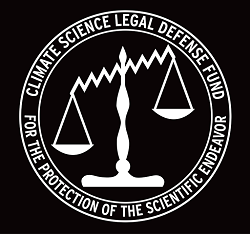
Story of the Week... Toon of the Week... Quote of the Week... Graphic of the Week... Photo of the Week... SkS Spotlights... Video of the Week... Coming Soon on SkS... Poster of the Week... SkS Week in Review... 97 Hours of Consensus...
AMICUS GROUPS FILE BRIEF TO PROTECT CLIMATE SCIENTISTS
New York, N.Y. — The Climate Science Legal Defense Fund (CSLDF) has asked the District of Columbia federal District Court to safeguard roughly 8,000 pages of privileged correspondence between nine climate scientists.

Under the federal Freedom of Information Act (FOIA), Judicial Watch, a conservative group, has sued for emails of scientists employed by the National Oceanic and Atmospheric Administration (NOAA), who authored a June 2015 study published in Science.
The study, which has since been replicated by other researchers, found that global temperatures are increasing faster than previously thought. The paper addresses and refutes prior claims about a so-called slowdown in global warming since the late 1990s.
Judicial Watch’s lawsuit is not the first attempt to obtain these researchers’ emails. In October 2015, Rep. Lamar Smith (R-Texas), who disputes the scientific consensus on climate change, tried to use congressional subpoena powers to obtain the NOAA emails. At that time, NOAA released hundreds of pages of documents to Rep. Smith, but steadfastly refused to produce the scientists’ email correspondence.
CSLDF filed the new brief on Friday, January 27 in partnership with the American Meteorological Society (AMS) and the Union of Concerned Scientists (UCS). The brief urges the court to protect scientific correspondence and preliminary drafts of publications from indiscriminate disclosure.
“Now more than ever, it is critical that we defend climate scientists and their research,” Lauren Kurtz, Executive Director of CSLDF, said. “Forcing the disclosure of scientists’ private emails is invasive, unnecessary, and hugely detrimental to the scientific method.”
Organizations across the political spectrum increasingly use public records laws to attack research findings and fields of study they dislike. As in this case, the records requests typically do not seek the data, methodology, or funding sources of completed studies. The requests instead seek privileged prepublication materials, such as preliminary drafts, private critiques from other scientists, and researchers’ personal documents and correspondence.
These types of records are generally protected from disclosure by the deliberative process privilege — as courts have repeatedly recognized in cases similar to this one. Government scientists’ correspondence, preliminary drafts, and peer review materials are quintessential deliberative, pre-decisional records safeguarded by Exemption 5 of the FOIA, 5 U.S.C. § 552(b)(5).
“Providing free and open access to all data and methodologies used to conduct scientific research is central to science and to scientific advancement,” Keith Seitter, Executive Director of AMS, said. “However, internal communications leading up to publication in the peer-reviewed literature should remain confidential so scientists can feel free to debate and resolve issues candidly without fear of their remarks being taken out of context.”
The brief explains that releasing privileged prepublication materials — generally treated as confidential within the scientific community — could significantly damage government scientists’ ability and willingness to conduct research into vitally important but politically charged subjects like climate change.
“Scientists, whether in government or academia, need to freely exchange and discuss ideas without constantly looking over their shoulders or worrying about legal action,” said Andrew Rosenberg, Director of the Center for Science and Democracy at the UCS.
###
About CSLDF: The Climate Science Legal Defense Fund was founded in 2011 in response to the increasing incidence of legal attacks against climate scientists. Its mission is to protect the scientific endeavor in general — and climate science and climate scientists in particular — from assaults being launched through the legal system, including intrusive public records requests.
About AMS: American Meteorological Society was founded in 1919 and is dedicated to advancing the atmospheric and related sciences for the benefit of society. AMS is committed to strengthening scientific work across the public, private, and academic sectors, and believes that collaboration and information sharing are critical to ensuring that society benefits from the best, most current scientific knowledge and understanding available.
About UCS: Union of Concerned Scientists was founded in 1969 and combines independent scientific research and citizen action to develop innovative and practical solutions to pressing environmental and security problems. UCS believes that a crucial ingredient in achieving these goals is maintaining research institutions within the federal government that foster an environment of independent and rigorous scientific inquiry free from political interference.
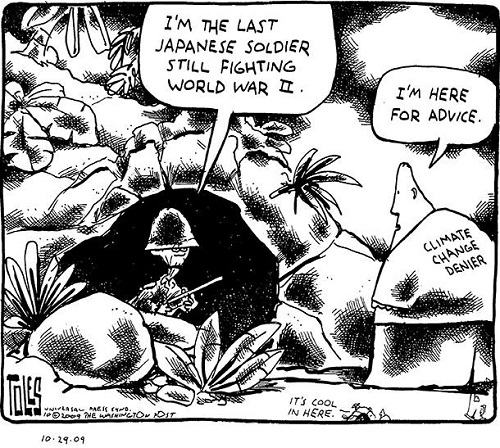
Donald Trump's phone call with Prime Minister Malcolm Turnbull made front pages and news bulletins around Australia and the US, but it led news bulletins in Germany, too, where leading European climatologist Stefan Rahmstorf is based.
"We are all very worried here," Rahmstorf, a professor at the Potsdam Institute for Climate Impact Research, says. "We should assume our worst fears will be realised."
'We should assume our worst fears will be realised': climate scientist on Donald Trump by Peter Hannam, Sydney Morning Herald, Feb 5, 2017
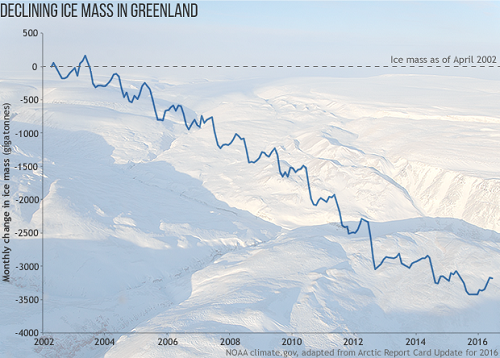
Greenland ice mass loss continued in 2016 by Michon Scott, NOAA's Climate.gov, Dec 28, 2016
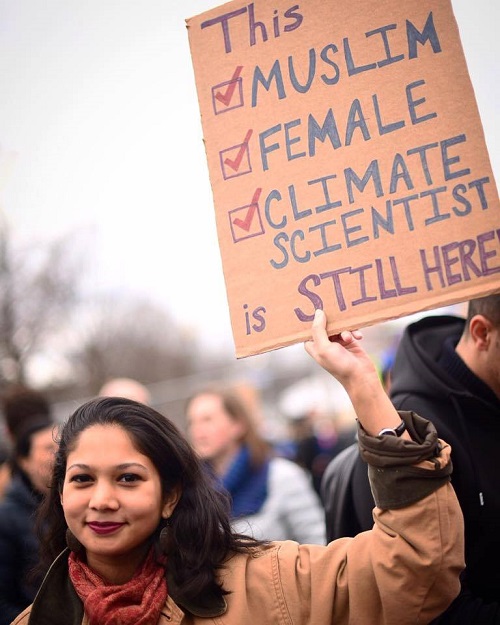
Spotted outside the White House last week. We're still here too. And we'll keep standing with you against Trump's destructive agenda.
Friends of the Earth U.S. Facebook page.
The Environmental Data and Governance Initiative (EDGI) is an international network of academics and non-profits addressing potential threats to federal environmental and energy policy, and to the scientific research infrastructure built to investigate, inform, and enforce. Dismantling this infrastructure — which ranges from databases to satellites to models for climate, air, and water — could imperil the public’s right to know, the United States’ standing as a scientific leader, corporate accountability, and environmental protection.
In response, EDGI is building online tools, events, and research networks to proactively archive public environmental data and ensure its continued publicly availability. We also are monitoring changes to federal regulation, enforcement, research, funding, websites and general agency management at agencies including EPA, DoE, NASA, NOAA, and OSHA. We aim to serve the environmental community and its allies, and to enable them to hold the new administration accountable, by preserving and improving public access to at-risk government environmental data, documents, and digital interfaces, and by monitoring, documenting, and analyzing change to federal environmental agencies. We also aim to create an open, collaborative network of individuals, non-profits, universities and companies who believe that science and data are vital for environmental governance.
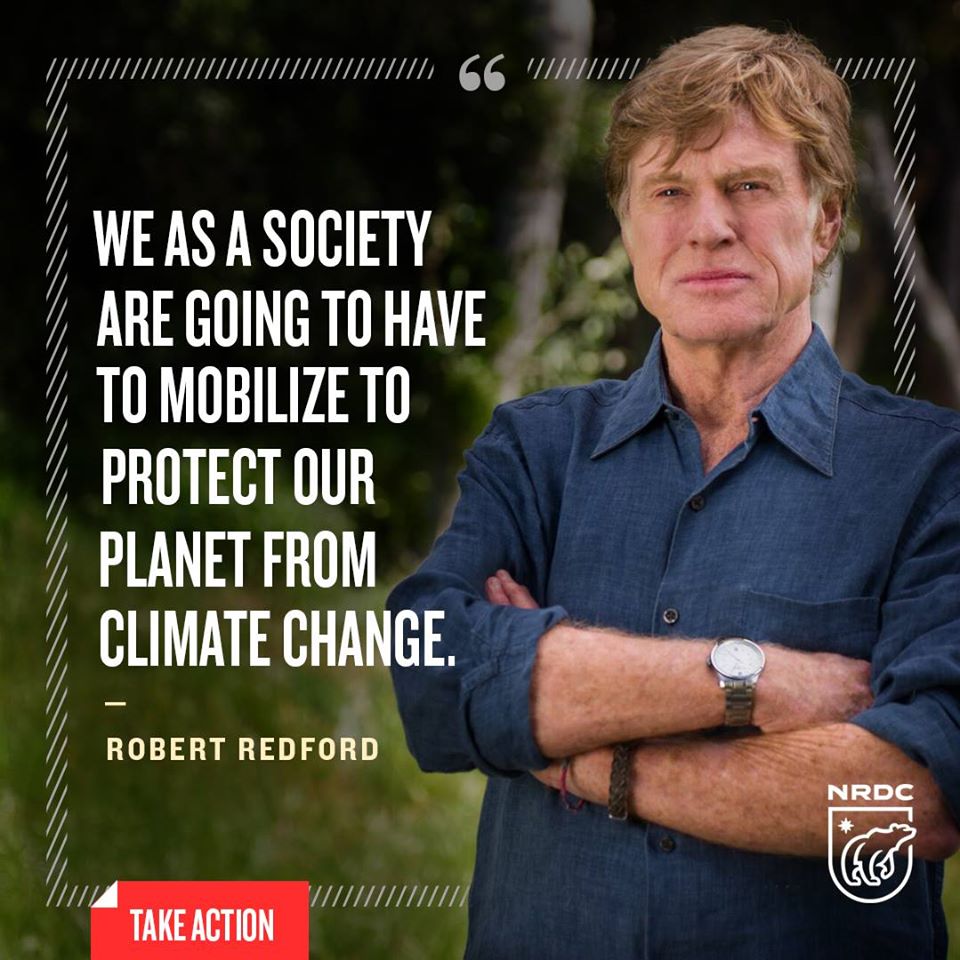
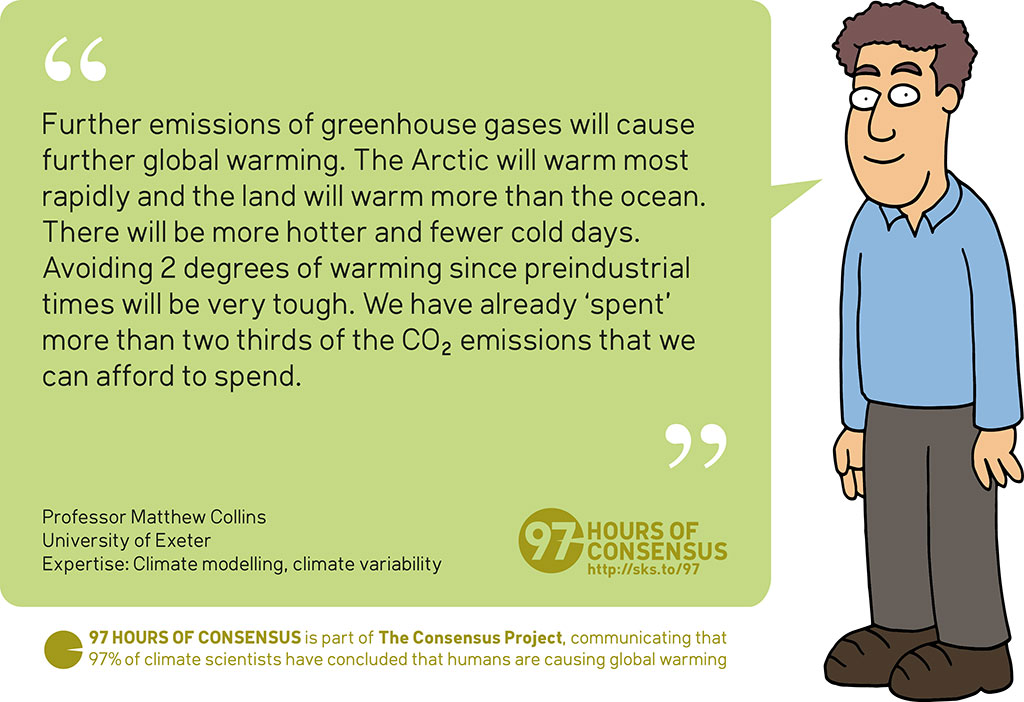
Quote derived with permission from author from:
"Further emissions of greenhouse gases will cause further global warming. The Arctic will warm most rapidly and the land will warm more than the ocean. There will be more hotter and fewer cold days. Mid-latitude areas that currently experience high rainfall will get more. Sea levels will continue to rise and snow and ice will melt back. If we follow the highest scenario of future greenhouse gases, the Arctic is expected to be ice-free before the middle of the 21st century. “Avoiding 2 degrees of warming since preindustrial times will be very tough. We have already ‘spent’ more than two thirds of the CO2 emissions that we can afford to spend."
High resolution JPEG (1024 pixels wide)
Posted by John Hartz on Sunday, 5 February, 2017
 |
The Skeptical Science website by Skeptical Science is licensed under a Creative Commons Attribution 3.0 Unported License. |